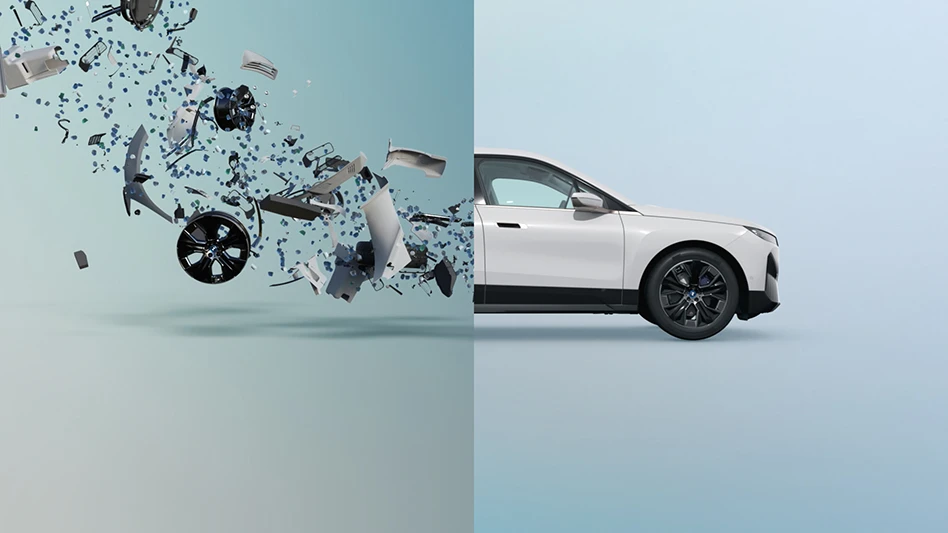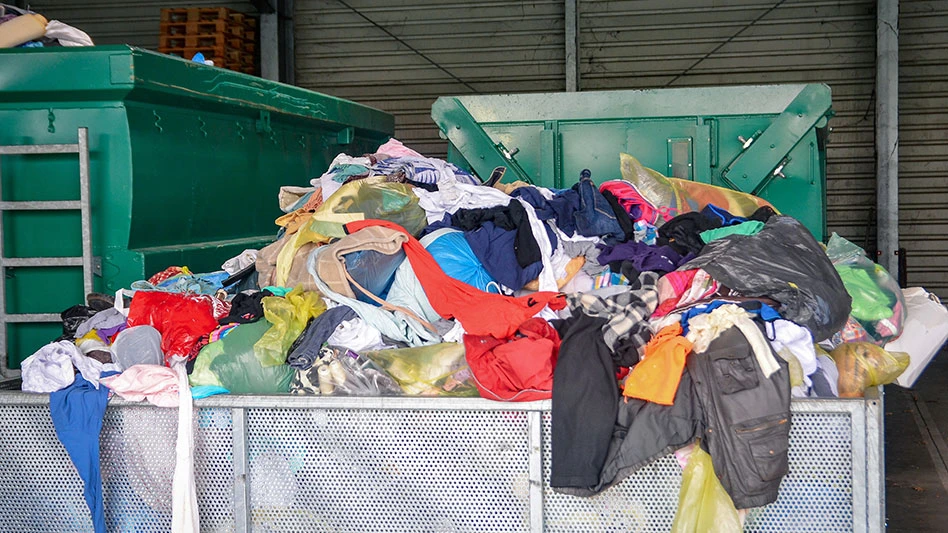
Image courtesy of BMW Group
The Munich-based BMW Group is heading up a new project with state funding called Car2Car, which it says is designed to explore the circular economy in automotive manufacturing.
The company is joining forces with representatives from the recycling industry, commodity processors and the scientific community to work on ways of improving the quality of secondary raw materials obtained from recycling end-of-life vehicles (ELVs).
The Car2Car project has received 6.4 million euros ($7.1 million) in support from the German Federal Ministry for Economic Affairs and Climate Action under that agency’s “New Vehicle and System Technologies” funding guidelines, according to BMW.
The Car2Car project will focus on several materials, including aluminum, steel, glass, copper and plastic. In the future, the automaker says “innovative dismantling and automated sorting methods should allow far greater quantities of the resources recovered from ELVs to be made suitable for use in the production of new cars than has so far been the case.”
The Car2Car project also includes an end-to-end evaluation of both the ecological and economic impacts of closed-loop recycling of the materials being investigated.
“The BMW Group is focusing rigorously on technological innovations as a driver of greater sustainability in all areas of the value chain,” says Uwe Köhler, a senior vice president with the automaker. “The cumulative know-how of the various partners involved in this project could potentially unlock whole new ways of obtaining valuable secondary raw materials. This would make it possible to save natural resources and reduce carbon emissions when manufacturing our vehicles.”
Michael Kellner, Parliamentary State Secretary at the Federal Ministry for Economic Affairs and Climate Action, says, “A stronger circular economy that conserves and reuses resources is a key step towards climate neutrality and safeguards supply chains at the same time. The funding from the Federal Ministry for Economic Affairs will help to make the automotive industry less dependent on raw material imports and ensure a long-term supply of raw materials for the economy, thereby boosting industrial value creation.”
The BMW Group says it has set a target of increasing the proportion of secondary materials in its brands’ new models from around 30 percent currently to 50 percent eventually. The company says the recyclability of the materials it uses already is taken into account during the design process for new models.
“Rethinking how materials are recovered from vehicles at the end of their product life cycle is also of key importance,” BMW says. The manufacturer says raw materials obtained from recycling can only be used as part of a circular economy if they also satisfy “the high standards of quality the BMW Group expects of materials for premium cars.”
The BMW Group is supplying 500 ELVs for research purposes of the project. A variety of models from its own portfolio—ranging from Mini to Rolls-Royce cars with combustion engines, plug-in hybrid systems and all-electric drive units—will undergo recycling processes “to produce a representative spectrum,” according to the automaker.
The project’s research includes evaluating how “limiting the flow of materials to vehicles affects the quality and purity of secondary raw materials,” BMW adds.
The Car2Car consortium also is “working out the optimum balance between the dismantling process and post-shredder technologies from a qualitative, economic and ecological perspective, in order to retain as much of the value initially invested in the manufacturing of a car as possible.”
The consortium contends the ELV dismantling process “can be partly or even highly automated with the help of robotics technology.” BMW Group also says the integration of systems for optical and artificial intelligence (AI)-assisted detection and sorting of reusable materials in the postshredder process brings about a significant improvement in the quality and purity of aluminum, steel, glass, copper and plastic.
Additional Car2Car research could look at the development of sensor technology using AI-based materials detection and other spectroscopic methods (such as laser-induced plasma spectroscopy) that is capable of identifying different steel and aluminum alloys.
“We are facing up to our responsibilities and taking a holistic approach as we search for concrete solutions regarding the efficient use of resources,” says Hilke Schaer, project manager at the BMW Group. “The interaction between players from the worlds of industry and science forms the basis for creating practical innovations within the Car2Car project that will lead to scalability potential for the future.”
BMW Group also is heading up another consortium project called Future Sustainable Car Materials (FSCM). In that effort, research institutes and companies are working together on “innovative process routes and material concepts for sustainable use of secondary materials and for reducing the carbon footprint of raw materials such as steel and aluminum to BMW."
The automaker adds, “The use of secondary aluminum is a prime example of how consistent use of recycled material can cut greenhouse gas emissions.”
BMW Group also says it is the only carmaker to run its own recycling center. which has been in operation since 1994. Up to 10,000 vehicles a year are processed at the Recycling and Dismantling Centre in Unterschleisheim, Germany, near Munich. Findings that emerge from the center are made accessible” to all players in the recycling industry,” according to BMW
In addition to several universities and trade groups, other Car2Car consortium partners include Scholz Recycling GmbH; Steinert UniSort GmbH; Thyssenkrupp Steel Europe AG; Salzgitter Mannesmann Forschung GmbH; Aurubis AG; Novelis Deutschland GmbH; Oetinger Aluminium GmbH; and Pilkington Automotive Deutschland GmbH.
Latest from Recycling Today
- The impacts of the nation’s first textiles EPR law
- Smurfit Westrock launches new packaging to address EU regulation
- ArcelorMittal wins legal round in GFG dispute
- Real Alloys partners with Enviri on residuals diversion project
- Registration Now Open for C&D World 2025
- The Scrap Show: Johnnie Jr., Roger and Marcie Rodriguez, Comal Iron & Metals
- ASTM releases textile circularity standards report
- Volvo adds two models to updated excavator line





